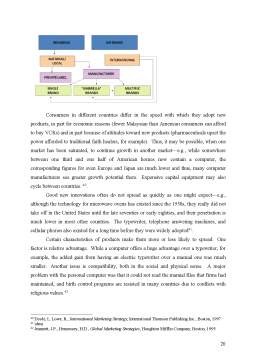Extras din licență
Chapter 1
International market and local culture
1.1. International Market Place
Trade is increasingly global nowadays, one important reason being technology, due to the improved transportation and communication opportunities, which made trade more practical, so the consumers have access to the best products from many different countries.
A domestic firm focuses only on its home market, having no ambitions to expand abroad, and does not perceive any significant competitive threat from abroad. It may get some orders from abroad, which are seen either as an irritation, for small orders, being a great deal of effort and cost involved in obtaining relatively modest revenue, or as unuseful.
As the firm begins to export more, it enters the export stage, where little effort is made to market the product abroad, although an increasing number of foreign orders are filled. In the international stage, as certain country markets begin to appear especially attractive with more foreign orders originating there, the firm may go into countries on an ad hoc basis--that is, each country may be entered sequentially, but with relatively little learning and marketing efforts being shared across countries. In the multi-national stage, some efficiencies are pursued by standardizing across a region. Finally, in the global stage, the focus centers on the entire World market, with decisions made optimize the product's position across markets--the home country is no longer the center of the product.
These stages represent points on a continuum from a purely domestic orientation to a truly global one; companies may fall in between these discrete stages, and different parts of the firm may have characteristics of various stages. Although a global focus is generally appropriate for most large firms, note that it may not be ideal for all companies to pursue the global stage.
Comparative advantage suggests trade between countries is beneficial because these countries differ in their relative economic strengths--some have more advanced technology and some have lower costs. The International Product Life Cycle suggests that countries will differ in their timing of the demand for various products. Products tend to be adopted more quickly in the United States and Japan, for example, so once the demand for a product is in the decline in these markets, an increasing market potential might exist in other countries, like Europe and the rest of Asia. Internalization or transaction costs refers to the fact that developing certain very large scale projects, such as an automobile intended for the World market, may entail such large costs that these must be spread over several countries .
Exchange rates come in two forms, as "floating" meaning that currencies are set on the open market based on the supply of and demand for each currency or "fixed", meaning that currencies may be "pegged" to another currency, to a composite of currencies or to some other valuable such as gold.
It is very difficult to maintain these fixed exchange rates, because governments must buy or sell currency on the open market when currencies go outside the accepted ranges. Fixed exchange rates, although they produce stability and predictability, tend to get in the way of market forces, so if a currency is kept artificially low, a country will tend to export too much and import too little.
When exchange rates are allowed to fluctuate, the currency of a country that tends to run a trade deficit will tend to decline over time, since there will be less demand for that currency. This reduced exchange rate will then tend to make exports more attractive in other countries, and imports less attractive at home.
There are two ways to measure the wealth of a country. The nominal per capita gross domestic product (GDP) refers to the value of goods and services produced per person in a country if this value in local currency were to be exchanged into dollars. The Gross Domestic Product (GPD) and Gross National Product (GNP) are almost identical figures. The GNP, for example, includes income made by citizens working abroad, and does not include the income of foreigners working in the country. Traditionally, the GNP was more prevalent; today the GPD is more commonly used--in practice, the two measures fall within a few percent of each other .
Usually, the nominal per capita GPD is more useful for determining local consumers' ability to buy imported goods, the cost of which are determined in large measure by the costs in the home market, while the purchase parity adjusted measure is more useful when products are produced, at local costs, in the country of purchase.
In some countries, income is quite unevenly distributed so that these average measures may not be very meaningful. In Brazil, for example, there is a very large underclass making significantly less than the national average, and thus, the national figure is not a good indicator of the purchase power of the mass market. There are important regional differences exist within some countries, as an example, income is much higher in northern Germany than it is in the former East Germany, and income in southern Italy is much lower than in northern Italy.
Bibliografie
1. Bradley, F., International Marketing Strategy, Prentice Hall International (UK), Ltd. London, 1995.
2. Doole, I., Lowe, R., International Marketing Strategy, International Thomson Publishing Inc., Boston, 1997.
3. Dupuis, M., Marketing international de la distribution, Les Editions d'Organisation, Paris, 1991
4. Jeannett, J.P., Hennessey, H.D., Global Marketing Strategies, Houghton Mifflin Company, Boston, 1995.
5. Kotler, Ph., Managementul Marketingului, Bucuresti 2002
6. Miron D., Comert international, Editura Academiei de Studii Economice, Bucuresti 2003
7. Popa I.F., Management international, Editura Econamica , Bucuresti 2001
8. Sivlia Marginean-suport curs "Globalizare
Preview document
Conținut arhivă zip
- Local culture's impact on international marketing based on Nigeria-Romania culture differences on international marketing.doc

















































